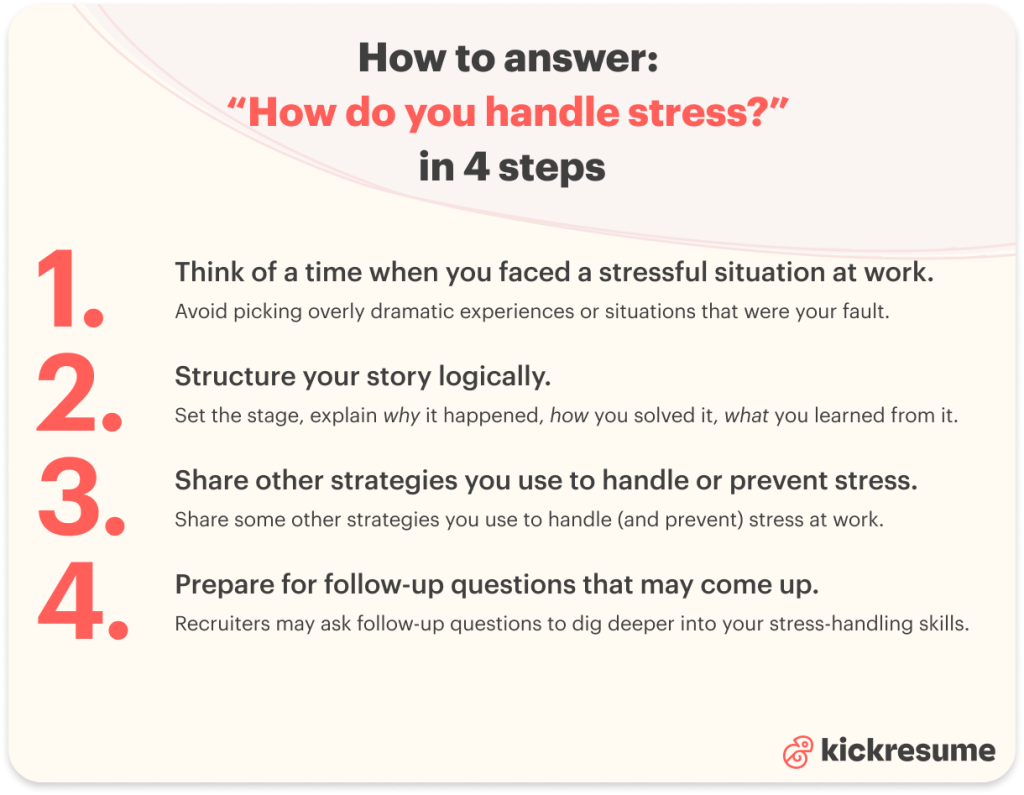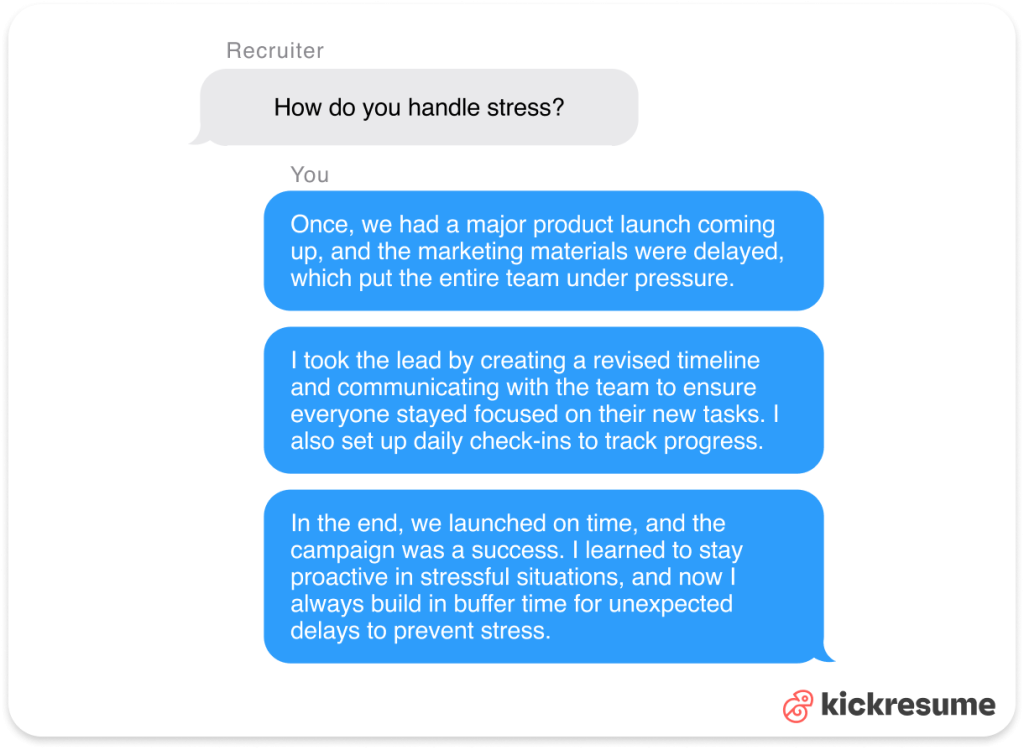Every job comes with its own set of stressful moments, and recruiters are well aware of this. That’s why they often ask the “How do you handle stress?” interview question.
Answering this question can be tricky.
You don't want to seem like someone who is easily stressed or brings stress into the workplace, but you also can't pretend that stress never affects you—because everyone deals with it at some point.
So, how do you answer this question? The good news is you can use even tricky questions like this to present yourself in the best possible way—if you know how to craft them properly.
In this article, we'll walk you through four simple steps to help you prepare a top notch response to “How do you handle stress?” interview question and even show you some sample answers for inspiration.
Plus, as always, we'll highlight what you should definitely avoid saying.
- Why are recruiters asking this question?
- How to answer “How do you handle stress?”
- Example responses to “How do you handle stress?” interview question
- How NOT to answer “How do you handle stress?” interview question
- Common sources of job stress & how to tackle them
- Key takeaways: "How do you handle stress?" interview question
Why are recruiters asking this question?
Recruiters often ask this question to see how you cope with pressure and challenges at work.
They want to know if you can stay calm and perform well when things get tough.
They also want to see if:
- You can handle work-related stress. Some jobs can be stressful due to tight deadlines, heavy workloads, or other demands. Recruiters just want to see if you can handle the pressure that comes with the job.
- You fit the group dynamic. The way you craft your answer also reveals a lot about your emotional resilience and your ability to cope with stress, which can influence the team dynamic.
- You have problem-solving skills. Your response can reveal how you approach stressful situations, such as prioritizing tasks or finding quick solutions, and whether you can stay productive under pressure.

How to answer “How do you handle stress?”
We prepared for you 4 simple steps to help you structure your answer and present yourself in the best possible way when asked: "How do you handle stress?"
Step 1: Think of a time when you faced a stressful situation at work.
Ideally, pick a situation where the stress wasn’t entirely your fault. Reflect on what caused it, how you managed it, and what was the outcome.
Remember, you want to show you're a good fit for the job, so avoid picking overly dramatic experiences unless you handled them with great success.
Step 2: Structure your story logically.
To make your point clearly and avoid going off-topic—the way you structure your answer matters. Be specific: Explain what happened and why, and focus on how you managed the situation and what you learned from it.
Here's how you do that:
- Introduce the situation. Start with a specific example, like a project with a tight deadline that required you to coordinate with multiple teams and manage competing priorities.
- Explain why it happened. Talk about what caused the stress, such as unexpected changes in the project, not having enough resources, or mix-ups in communication.
- How you solved it. Detail what you did to fix the problem. For example, you might have reorganized your to-do list to tackle the most urgent tasks first, used a new tool to keep track of everyone’s work, or set up extra meetings to clarify who was doing what. Describe how these actions helped you manage the stress and keep things moving.
- What you learned from it. Identify the stressor, focus on what you learned from the experience, and the steps you took to handle similar situations better in the future.
Step 3: Share other strategies you use to handle or prevent stress.
This is probably the most important part of your answer to this question.
You've already shared a specific situation and how you handled it, now it’s time to explain your general approach to handling stress at work.
You can do that by sharing some other strategies you use to handle (and prevent) stress at work.
For example, if you work in project management and often face tight deadlines, you might say:
"To avoid getting overwhelmed, I started using project management software to keep track of tasks and deadlines. I also set aside regular time for team check-ins to address any issues early on and ensure we stay on track."
Step 4: Prepare for follow-up questions that may come up.
Given that managing stress is a crucial part of many roles, expect the recruiter to ask follow-up questions to dig deeper into your stress-handling skills.
They may want to explore your examples further or ask about other situations to ensure you’re a good fit for the job's demands.
You can expect these common follow-up questions:
- How do you prioritize tasks when you're under pressure?
- What strategies do you use to stay calm and focused when you're under pressure?
- How do you handle stress when working in a team?
- What are some signs that you’re becoming overwhelmed, and how do you address them?
When answering these questions, remember to be specific. Keep referring back to your example and draw your answers from that experience.

Example responses to “How do you handle stress?” interview question
With theory in place, it's now time to look at a couple of example responses.
#1 Example response

How NOT to answer “How do you handle stress?” interview question
As you might already suspect, there can definitely be a wrong answer to this interview question. And it might be the reason why you don't get the job.
Here are some things that you should AVOID:
- Saying you don't experience stress. Everyone experiences stress to some extent. Saying you don't experience stress means you either lie or you're out of touch.
- Sharing situations in which you were the problem. Pick an example where you weren’t the main cause of the stress. This approach helps you present yourself positively.
- Vague responses. Give a specific example to make your answer stronger. Avoid saying something like, "I was stressed, but everything worked out," as it kind of misses the point of the question.
- Mixing personal and work-related stress. Focus on job-related stress in your response. Don’t mix personal life stress with work-related examples, as this question is specifically about handling stress in a professional setting.
Common sources of job stress & how to tackle them
While you can’t always predict stressful situations at work, some stressors are very common in almost any job.
Knowing what these typical challenges are can help you handle them better.
Here are 5 common work-related stressors, along with tips on how to prevent them and handle them if they come up:
- Tight deadlines. To manage this, break the project into smaller tasks and set mini-deadlines. Communicate early with your manager if you’re falling behind and ask for extra help if needed.
- High-stakes projects. Break the project into smaller tasks with their own deadlines. This makes the work more manageable. Also, seek feedback from a trusted colleague or mentor and rehearse your presentation in front of them to build confidence.
- Unexpected changes. When things change suddenly, list out the new tasks and adjust your plan. Update your team and manager about the changes. If a client adds new requests, quickly update your schedule and see if you need extra help or resources.
- Poor communication. If you're unsure about something, ask for a follow-up email or a quick summary. Set up regular check-ins with your team to make sure everyone understands what’s going on.
- Conflict with colleagues. If you have a disagreement, ask to talk privately with the person involved. Try to work out a solution together. If needed, involve a manager to help resolve the issue.
Key takeaways: "How do you handle stress?" interview question
To wrap things up, let's sum up 4 simple steps to help you craft a great response when asked the common job interview question: "How do you handle stress?"
- Step 1: Think of a time when you faced a stressful situation at work.
- Step 2: Structure your story logically.
- Step 3: Share other strategies you use to handle or prevent stress.
- Step 4: Prepare for follow-up questions that may come up.
People often say there's no wrong answer, but when it comes to job interviews, that isn't always true.
Here’s what you should avoid when answering this question:
- Avoid saying you don't experience stress.
- Avoid sharing situations in which you were the problem.
- Avoid vague responses.
- Avoid mixing personal and work-related stress.
And while you're at it, check out how to prepare for other common interview questions:



